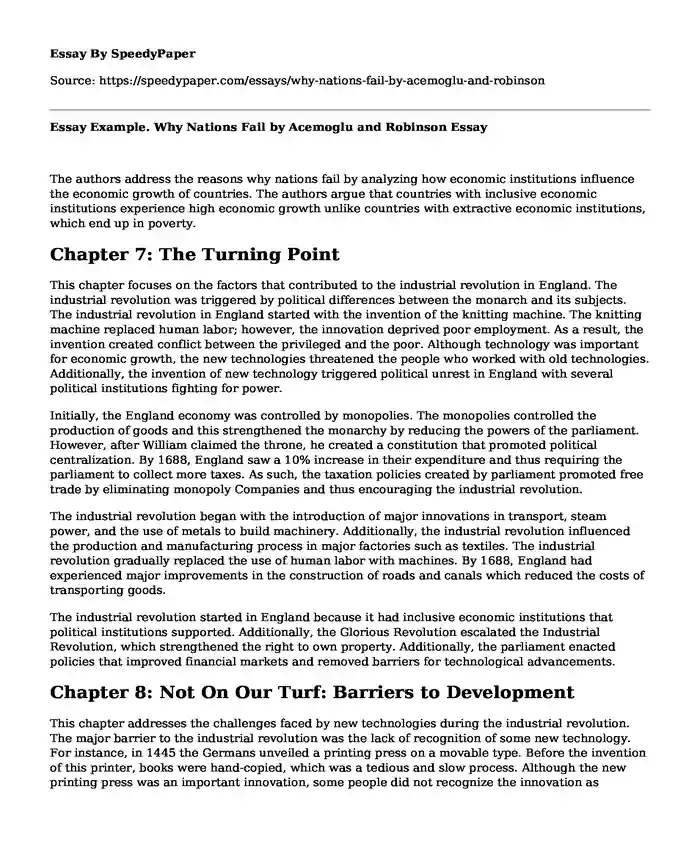The authors address the reasons why nations fail by analyzing how economic institutions influence the economic growth of countries. The authors argue that countries with inclusive economic institutions experience high economic growth unlike countries with extractive economic institutions, which end up in poverty.
Chapter 7: The Turning Point
This chapter focuses on the factors that contributed to the industrial revolution in England. The industrial revolution was triggered by political differences between the monarch and its subjects. The industrial revolution in England started with the invention of the knitting machine. The knitting machine replaced human labor; however, the innovation deprived poor employment. As a result, the invention created conflict between the privileged and the poor. Although technology was important for economic growth, the new technologies threatened the people who worked with old technologies. Additionally, the invention of new technology triggered political unrest in England with several political institutions fighting for power.
Initially, the England economy was controlled by monopolies. The monopolies controlled the production of goods and this strengthened the monarchy by reducing the powers of the parliament. However, after William claimed the throne, he created a constitution that promoted political centralization. By 1688, England saw a 10% increase in their expenditure and thus requiring the parliament to collect more taxes. As such, the taxation policies created by parliament promoted free trade by eliminating monopoly Companies and thus encouraging the industrial revolution.
The industrial revolution began with the introduction of major innovations in transport, steam power, and the use of metals to build machinery. Additionally, the industrial revolution influenced the production and manufacturing process in major factories such as textiles. The industrial revolution gradually replaced the use of human labor with machines. By 1688, England had experienced major improvements in the construction of roads and canals which reduced the costs of transporting goods.
The industrial revolution started in England because it had inclusive economic institutions that political institutions supported. Additionally, the Glorious Revolution escalated the Industrial Revolution, which strengthened the right to own property. Additionally, the parliament enacted policies that improved financial markets and removed barriers for technological advancements.
Chapter 8: Not On Our Turf: Barriers to Development
This chapter addresses the challenges faced by new technologies during the industrial revolution. The major barrier to the industrial revolution was the lack of recognition of some new technology. For instance, in 1445 the Germans unveiled a printing press on a movable type. Before the invention of this printer, books were hand-copied, which was a tedious and slow process. Although the new printing press was an important innovation, some people did not recognize the innovation as desirable. Some leaders in the Islamic States restricted the press from printing Arabic because it could make their population harder to control.
Another barrier was the merger of England with other States such as Spain leading to absolutism. The ruler of Spain, Habsburg, disagreed with granting people the right to own property. Therefore, the expansion of the industrial revolution from England to other European countries was limited. The absolutism in Spain created an unprecedented economy in England which affected an industrial revolution.
Additionally, there was fear that the industrial revolution would threaten the political power of some people. For instance, Francis I discouraged the industrial revolution because industries would create factories, which would result in the migration of poor people from rural areas into towns. It was feared that the workers would join together and support the opposition of absolutism. Absolutism was not only manifested in Europe but also in Asian countries. The practice of absolutism in China was a major barrier to the industrial revolution because it disallowed the shipping of new technologies from Europe.
Cite this page
Essay Example. Why Nations Fail by Acemoglu and Robinson. (2023, Feb 16). Retrieved from https://speedypaper.com/essays/why-nations-fail-by-acemoglu-and-robinson
Request Removal
If you are the original author of this essay and no longer wish to have it published on the SpeedyPaper website, please click below to request its removal:
- Evaluate Pricing and Retail Strategy. Marketing Essay Example.
- Essay Example on Universal Health Care in the US, Canada, and Germany
- Nursing Essay Sample: Required Skills and Competencies of an RN in the Community Setting
- Essay Sample: Should People Be Allowed to Live in California?
- Free Essay: A Job Applicant's Social Media Postings
- Free Essay: Ordinary Medicine Extraordinary Treatments, Longer Lives, and Where to Draw the Line
- Critical Infrastructure - Free Essay Sample
Popular categories





